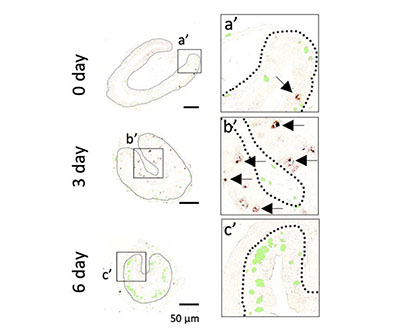
Cross-sections of the intestines of Xenopus laevis tadpoles treated with thyroid hormone for 0, 3, or 6 days. Green staining indicates proliferating cells, and brown staining indicates cells undergoing apoptosis.
Credit: Shi Lab
Amphibian metamorphosis—the process by which frogs and their relatives adapt from aquatic to terrestrial life—resembles the period of postembryonic development in mammals. During postembryonic development, many organs mature into their adult forms, and thyroid hormone (T3) levels peak. T3 also plays a critical role in amphibian metamorphosis, making metamorphosis from tadpole to frog a useful model for scientists to investigate how T3 regulates adult organ development in mammals.
The Shi Lab and other researchers are studying the ways in which T3 regulates cell fate and tissue transformation during metamorphosis. In a recent review article, Dr. Shi and colleagues discussed how research with Xenopus frog species is enhancing understanding of intestinal remodeling.
Intestinal remodeling involves degeneration of the larval epithelium—the inner layer that forms the lining of the intestine—by apoptosis, or programmed cell death, and formation of adult stem cells that later proliferate and differentiate into the adult epithelium. Recent research has illustrated that T3 induces formation of adult stem cells by a process in which the larval epithelial cells become less specialized. Other studies have suggested that T3-signaling in both epithelial and non-epithelial tissues is critical for adult stem cell development.
Gene expression studies—analyses of the degree to which certain genes are turned “on” or “off”—in tadpole intestines revealed the widespread role of T3 during intestinal metamorphosis. Potentially, the activation of the cell cycle by T3 may help decide whether larval epithelial cells die or transform into adult stem cells during intestinal metamorphosis. Future studies on T3-signaling during development of the adult intestine in other species would provide further insights into how human intestines form and function, the authors suggest.
NICHD co-authors of the review include Yuta Tanizaki, Yuki Shibata, and Wonho Na.
Learn more about the Cell Regulation and Development group: https://www.nichd.nih.gov/about/org/dir/affinity-groups/CRD
 BACK TO TOP
BACK TO TOP